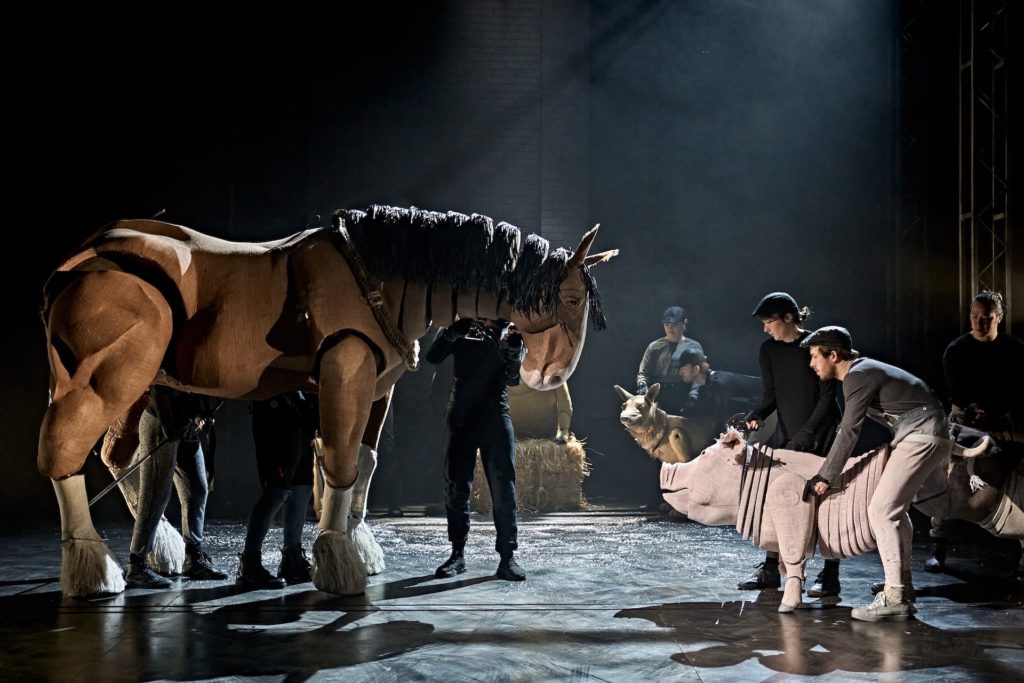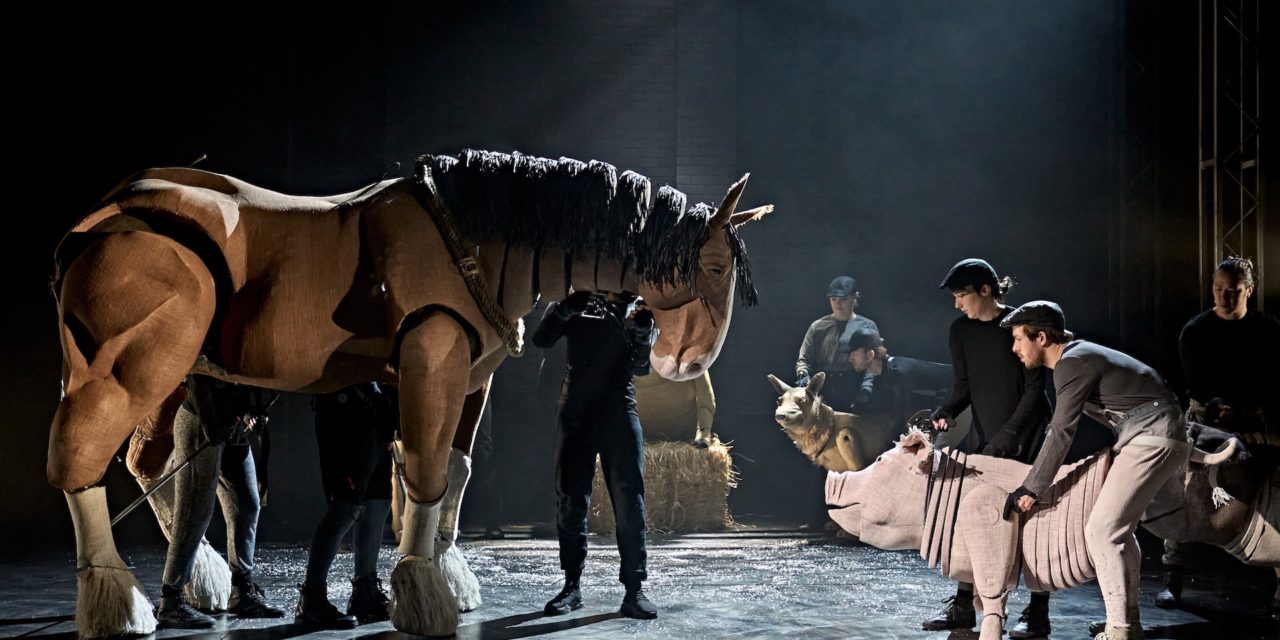
Born in Sheffield and brought up in Northumberland, Toby Olié was recruited directly from the puppetry course at the Royal Central School of Speech and Drama into the creation of War Horse at the National Theatre; he played the hind of Joey the horse in the original production, before moving to the head for the West End transfer. He has created puppetry for shows including Pinocchio at the National Theatre, Alice’s Adventures in Wonderland at the Royal Ballet and Disney’s new staging of The Little Mermaid in Holland, Russia and Japan. He also creates his own productions as Gyre & Gimble, the company he founded with his former War Horse compatriot Finn Caldwell. He talks to Mick Hunter about creating the puppet cast for Animal Farm.
What are the challenges of this show?
Every character apart from the farmer is an animal. We have over 30 life-sized puppets, from a huge cart horse to tiny pigeons, so it’s a question of how to get maximum range of articulation in so many puppets with only 14 operators. Boxer the cart horse has three operators, but Clover – who we’ve changed from a horse to a cow – can only have two. All of the animal characters talk too, which is a challenge, but we found a really interesting way of making it work: we tell the story using each animal’s physicality but then you hear their dialogue as if their actions are being translated for you. We’re also shifting perspective during the show, so you see moments of high octane action in miniature puppet scale, and the intimate, internal moments with the life-sized puppets. The construction of the animals took eight and a half months – the longest puppet build we’ve ever undertaken.

What does it take to be a puppet operator?
I’m drawn to performers who have an innate sense of physical listening to each other so they can be in tune with each other when collectively performing a puppet character. When someone has ‘puppeteer’ on their CV it’s no guarantee they will have that. Only a handful of our cast would say they are a puppeteer by trade. Many of them trained primarily as actors, dancers, even stilt walkers – they’re from all corners of the industry. I wanted a big mix of ages, experience and skill sets when casting the show.
What’s the trick of making an animal puppet work?
In terms of both their design and performance, you want to immerse yourself in the anatomy and physical language of the animal, particularly its emotional indicators like the ears or tail, the difference in gait between a trot and a gallop. For this show, where we are telling a human allegory through animals, we have to decide what of that animal repertoire is helpful and how the articulation and control points of the puppet allow the puppeteers to embody and communicate it visually. Helpfully animals give away their emotions far more quickly than we do, they are far more responsive, immensely emotive things to watch.
Do children respond more easily to puppets than adults?
Puppets are at their strongest when they’re doing the smallest, most minimal actions that really draw you in. While children are closer to a state of play, with toys and imaginative belief, and so get it quite instantly. I always enjoy how adults expect themselves to be more distanced or cynical but if the puppet is doing it’s thing and it is doing it well, they fall just as fast as the children.
Was War Horse a game changer for the perception of puppetry?
Definitely. Although plenty of companies were already working with puppets in adult theatre, this was a big step forward into a mainstream, populist show. And the reaction to it was mind blowing: it was astonishing to see a puppet bear the emotional weight of an audience for two and a half hours. War Horse is the puppeteer equivalent of an actor playing Hamlet: that horse doesn’t leave the stage throughout the whole show. You can see that audiences think of puppetry as part of their theatrical palette now. They get it.
How did you get into puppetry?
I remember religiously watching Sesame Street as a child, enjoying a world where puppets are within a human world and no one bats an eyelid. Then, when I was six or seven and in my Jurassic Park phase – which I’m arguably still in – I found an Usborne ‘How-to Make Puppets’ book in the school library. I’d always made things in a Blue Peter-ish way but that book definitely ignited a spark that led to me putting on shows with puppets made of toilet rolls and cereal boxes behind the ironing board for my family, who were very understanding and supportive. Later, I saw The Lion King in the West End. The mechanics were exposed, and it was avant garde by commercial theatre standards, but to see it taken to heart by so many people made me think: yes this is what I want to do
What’s your workshop like?
I’d like to think if you open the studio door it’s like walking into Willy Wonka’s fantastically imaginative chocolate room, but in reality there’s a lot more wood dust in the air and glue guns lying around. I enjoy keeping puppets from previous shows in my space. I often say they are more like musical instruments than props because they’re so bespoke and often need fine tuning. They are made to give a performance and the thought of them ending up in storage or going mouldy in someone’s garage is a fate I try to avoid.
How was your lockdown?
I’d just opened an adaptation of Neil Gaiman’s graphic novel The Wolves in the Walls at the Little Angel Theatre, and we were halfway through making the dalmatians for 101 Dalmatians at Regent’s Park Open Air Theatre, when everything ground to a halt. Under lockdown I created a couple of puppet short films online – filmed on my iPhone with desk lamp lighting. Halfway through making the second one I realised I was using the ironing board I had put shows on behind as a child, which I’d inherited from my parents when going to university. It took a pandemic for me to come full circle.
Central no longer does the puppetry course you took: where could someone train to be a puppeteer now?
I’m hoping to talk with Central about how puppetry can have a life there again. A lot of theatre companies run short training courses to teach the principles of puppetry. One course I am very passionate about is the Curious School of Puppetry, created by Sarah Wright – whose parents founded the Little Angel Theatre. She runs a six to ten week course at the start of every year that gives amazingly intensive training from people who work in the industry, for 15 to 18 students. She and I dream of finding a building where she can have a puppet school and I can have a workshop and rehearsal space.
Animal Farm appears at the Theatre Royal Bath from Tuesday 1st to Saturday 5th March. Tickets are on sale at the Theatre Royal Bath Box Office on 01225 448844 and online at www.theatreroyal.org.uk


